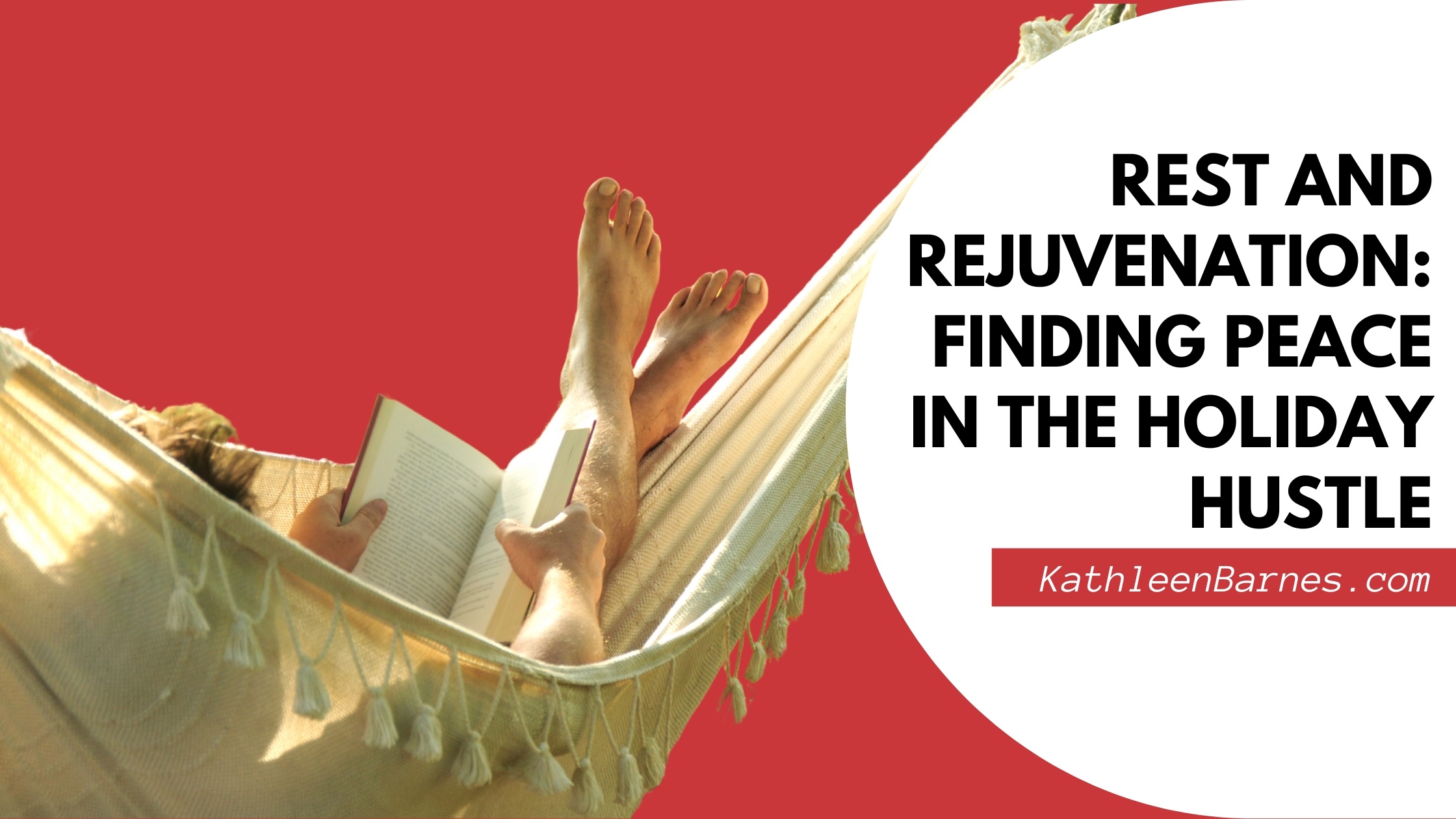As the festive cheer of the holiday season unfolds, our days often become a whirlwind of activities and commitments.
From preparing lavish meals and decorating our homes to shopping for the perfect gifts and attending a myriad of social gatherings, this time of year can feel like a non-stop hustle.
Amidst the twinkling lights and joyous carols, there’s a less discussed aspect of the season: the sheer busyness and potential for overwhelm it brings.
In this bustling period, it’s essential not to overlook the importance of rest and rejuvenation.
Balancing the holiday spirit with moments of tranquility and self-care is a must for maintaining our well-being.
Remember, taking time to recharge amidst the holiday chaos isn’t a luxury—it’s a necessity for sustaining our health and happiness during the most wonderful time of the year.
Understanding the Importance of Rest
The holiday season can inadvertently become a period of continuous stress and sleep deprivation.
Our bodies and minds are often pushed to the limit. Understanding the impact of this relentless pace is important for safeguarding our health and happiness.
Physical and Mental Impacts of Stress and Lack of Sleep
The consequences of ongoing stress and insufficient sleep during the holidays are not just fleeting discomforts; they have profound implications for our physical and mental health.
Physiologically, chronic stress can lead to a weakened immune system, making us more susceptible to seasonal illnesses.
It can also exacerbate chronic health conditions and lead to issues like high blood pressure and heart problems.
Lack of sleep, on the other hand, impairs cognitive functions such as memory, decision-making, and attention. It also affects mood regulation, often leading to irritability, anxiety, and an increased risk of depression.
The Benefits of Adequate Rest
Prioritizing rest during the holiday season can have a multitude of benefits. 
Adequate rest rejuvenates the body, allowing it to repair and strengthen its natural defenses. It’s a time when the immune system gets a boost, helping us fend off common colds and flu, which are prevalent during this time of the year.
Mentally, sufficient rest improves cognitive functions and emotional well-being. It enhances concentration, creativity, and problem-solving abilities, making us more efficient and less prone to errors in our holiday planning and execution.
Rest is not just about the quantity of sleep but also the quality.
Deep, restorative sleep helps in emotional processing and stress management, allowing us to maintain a better mood and a more balanced outlook.
In essence, rest acts as a reset button for our minds and bodies, enabling us to enjoy the holiday festivities to their fullest, without the burden of fatigue and stress-related ailments.
The Challenge of Resting During the Holidays
The holiday season presents a significant challenge when it comes to finding time for rest.
Despite understanding the importance of rest, many of us struggle to prioritize it amidst the flurry of seasonal activities.
This struggle is often compounded by societal pressures and deeply ingrained perceptions about busyness and productivity.
Common Challenges in Finding Time to Rest
One of the primary obstacles to resting during the holidays is the sheer volume of tasks and events.
The endless list of holiday obligations often leads to a scenario where rest takes a back seat, viewed as something that can be postponed until after the festivities.
The pressure to create a perfect holiday experience can lead to late nights and early mornings, further eating into precious rest time.
This is especially true in today’s digital age, where the constant barrage of perfect holiday images on social media can heighten our expectations and workload.
Societal Pressure and Its Impact on Health
Societal pressure plays a pivotal role in how we approach rest during the holidays.
There is a widespread notion that being constantly busy equates to being productive and fulfilling our roles effectively.
This mindset can lead to a form of guilt when taking time for rest, as if pausing to recharge is an indulgence or a sign of inefficiency.
This glorification of busyness not only affects our ability to rest but also has detrimental effects on our health.
The constant push to stay active ignores the body’s natural need for rest and recovery, an essential component of maintaining good health and well-being.
Tips for Quality Sleep
Achieving quality sleep can seem like a distant dream.
However, with a few practical adjustments and mindful practices, it is possible to greatly improve your sleep quality, even amidst the busiest of times.
Here are some effective strategies to help you attain restful sleep during the festive period.
Kathleen has many articles to help you get quality sleep year around. See those here.
Daytime Relaxation Techniques
In the midst of the holiday season’s bustle, finding moments of calm can be just as effective as getting a good night’s sleep.
Incorporating relaxation techniques into your daily routine can help mitigate stress and maintain a sense of peace throughout the day.
Here are some effective strategies to cultivate relaxation and mindfulness, even during the busiest times.
Breathing Exercises
One of the simplest yet most powerful ways to trigger relaxation is through controlled breathing. It can be done anywhere and anytime you feel overwhelmed.
Try these techniques:
- Deep Breathing – Focus on taking slow, deep breaths, inhaling through your nose and exhaling through your mouth. This helps activate the parasympathetic nervous system, which induces a state of calm.
- 4-7-8 Breathing – Breathe in for a count of four, hold your breath for seven seconds, and exhale for eight seconds. This pattern is particularly effective in reducing anxiety.
Short Meditation or Mindfulness Practices
Meditation and mindfulness can significantly lower stress levels and improve overall well-being.
Consider incorporating these practices into your daily routine:
- Guided Meditation – Use a guided meditation app for a quick 10-15 minute session to center your mind and reduce stress.
- Mindfulness Breaks – Take short breaks throughout the day to practice mindfulness. This could involve paying full attention to a simple activity like drinking a cup of tea, focusing on the sensations and experience in the present moment.
Gentle Physical Activities
Engaging in gentle physical activities can be remarkably effective in promoting relaxation:
- Yoga – Yoga combines physical postures, breathing exercises, and meditation to enhance relaxation. Even a short session can help ease tension in the body and mind.
- Walking – A brisk walk, especially in a natural setting, can be incredibly therapeutic. It allows you to get some exercise while also providing an opportunity to clear your mind.
Remember, the key to these daytime relaxation techniques is regular practice.
By integrating them into your daily routine, you can create little oases of calm amidst the holiday chaos.
These practices not only provide immediate relief from stress but also contribute to long-term wellness, helping you navigate the holiday season with more ease and joy.
Setting Boundaries for Personal Time
Amidst the holiday season’s festivities and obligations, setting boundaries for personal time is essential for maintaining balance and ensuring rest.
This often involves making conscious decisions about work and social commitments, and learning the art of saying “no” when necessary.
Here’s some advice on how to navigate this challenging aspect.
Understanding the Importance of Personal Boundaries
Personal boundaries are like invisible lines that define the limits of how much we can engage with work, social activities, and other demands without compromising our well-being.
Establishing these boundaries helps to prevent burnout, stress, and exhaustion, ensuring that we have enough energy and time for rest and rejuvenation.
Tips for Setting Healthy Boundaries
- Prioritize Your Commitments – Evaluate your holiday activities and responsibilities. Prioritize what’s most important and fulfilling to you, and consider scaling back on less critical commitments.
- Learn to Say “No” Gracefully – It’s okay to decline invitations or requests that don’t align with your needs for rest and relaxation. Practice polite but firm ways to say no, such as “Thank you for the invite, but I need to spend some time resting this weekend.”
- Communicate Your Needs – Be open and honest with friends, family, and colleagues about your need for personal time. Most people will understand and respect your need to take care of yourself.
- Set Work-Life Boundaries – If you’re working during the holidays, be clear about your work hours and resist the urge to check work emails or take calls outside of those times. Let your colleagues know when you’ll be unavailable.
- Schedule ‘Me’ Time – Proactively block out time in your schedule for activities that help you relax and recharge. Treat this time as non-negotiable, just like any other important appointment.
The Power of Saying “No”
Saying “no” can be challenging, especially during a season often associated with generosity and sociability.
However, it’s important to remember that saying “no” to overcommitting is actually a form of self-care. It’s about giving yourself permission to prioritize your health and well-being.
By doing so, you’re not only taking care of yourself but also ensuring that you can be fully present and enjoy the moments you choose to engage in.
Remember, taking care of yourself is the best gift you can give to yourself and those around you.
Embracing a Restful Mindset
In the journey toward achieving relaxation and quality rest, mindset plays a pivotal role.
Often, the biggest hurdle to overcome is not the external bustle of the holiday season, but our internal attitudes towards rest.
Embracing a restful mindset involves a significant shift in perspective, where rest is viewed not as a luxury or a sign of laziness, but as an integral and productive part of a well-rounded life.
The Role of Mindset in Relaxation
Our thoughts and attitudes have a profound impact on our ability to relax.
A mind cluttered with worries about unfinished tasks or guilt over taking time off is unlikely to find peace and tranquility.
Conversely, a mindset that values and respects rest as essential to health can more easily enter a state of relaxation.
Shifting Perspectives on Rest
- Recognize the Value of Rest – Understand that rest is not time wasted. It’s a vital process that allows our bodies and minds to recover, leading to increased productivity and creativity when we return to our activities.
- Challenge the Culture of Busyness – Society often equates being busy with being important or successful. Challenge this notion by acknowledging that rest and relaxation are key components of a successful, balanced life.
- Focus on Quality, Not Just Quantity – It’s not just about the number of hours you rest or sleep; it’s about how peaceful and rejuvenating those hours are. Quality rest can be more beneficial than longer periods of poor-quality rest.
- Practice Mindfulness and Gratitude – Mindfulness helps in being present and fully experiencing moments of rest. Expressing gratitude for these moments can enhance their restorative power.
Embracing Rest as a Productive Activity
Changing your mindset to view rest as a productive and necessary activity can be transformative.
Here’s how:
- Plan for Rest – Just as you would schedule important appointments, schedule time for rest. This validates its importance in your life.
- Set Realistic Expectations – Understand that it’s okay not to accomplish everything. Give yourself permission to rest without feeling guilty.
- Celebrate Small Moments of Rest – Whether it’s a five-minute breathing exercise or an afternoon nap, acknowledge and appreciate these moments of relaxation.
- Create a Restful Environment – Surround yourself with things that promote relaxation, such as calming music, comfortable seating, or pleasant scents. This environment can reinforce your restful mindset.
By shifting our perspective, we can fully embrace and enjoy the restorative power of rest, especially during the demanding holiday season.
Final Thoughts
As we navigate the sparkling lights and festive gatherings of the holiday season, it’s imperative to remember the importance of prioritizing our well-being.
The gift of rest and relaxation is one of the most valuable presents we can give ourselves and our loved ones. It’s an investment in our health, happiness, and the quality of our holiday experiences.
The journey towards achieving a restful holiday season is personal and unique for each of us. It may involve setting boundaries, adopting relaxation techniques, or simply shifting our mindset to embrace the true value of rest.
I invite and encourage you to share your insights and tips in the comments below.
Your experiences might provide valuable guidance or inspiration to someone else seeking to find balance during this busy time of year.
Let’s create a community of support where we can learn from each other’s experiences and embrace a holiday season filled with peace, joy, and rejuvenation.
Wishing you a holiday season that’s as restful as it is joyful – a time where you can truly experience the wonder and warmth of the season, balanced with the rest and relaxation you deserve. Happy holidays!







